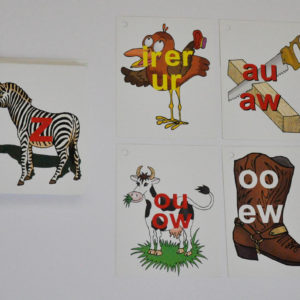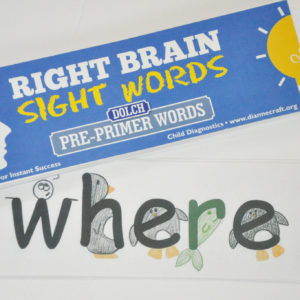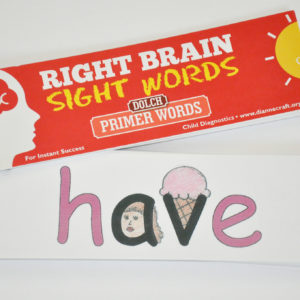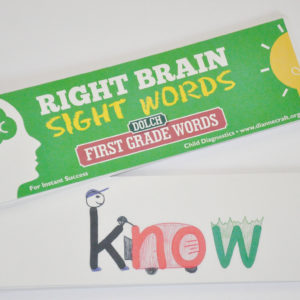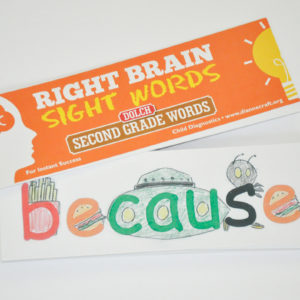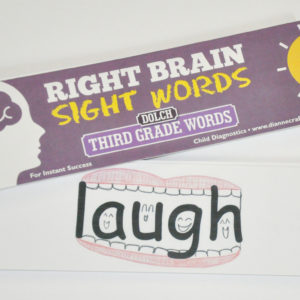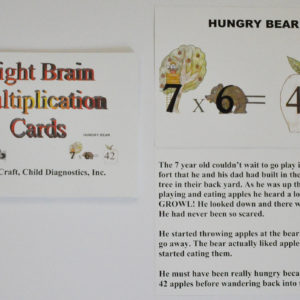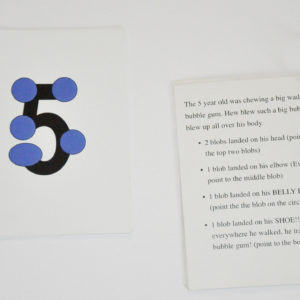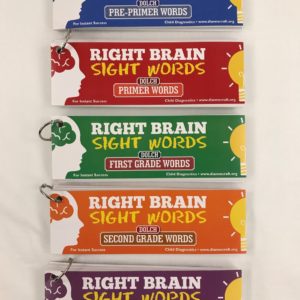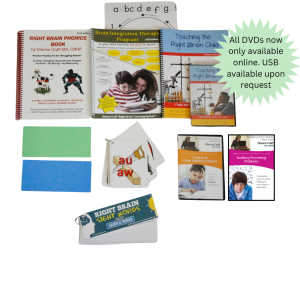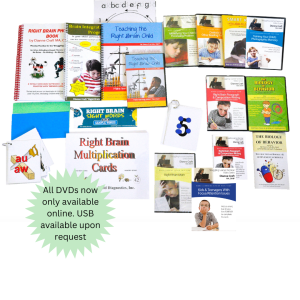Flash Cards
The Dianne Craft “Right Brain” Learning System has several flashcards to help your learner in
MATH!
- visual number cards for addition & subtraction
- right brain multiplication memorizers to learn math facts
PHONICS!
- phonics cards to quickly learn sounds of letters and blends!
SIGHT WORDS!
- Easily learn the 220 Dolch Sight Word Cards!
-
Sale!These wonderful cards make the process of learning the sounds of letter combinations so easy by using the IMBEDDING technique. The Right Brain, which is the site of our Long Term Memory, is our Visual Brain. Thus, when we put the letters (Left Brain) directly ON the picture that gives that sound, the brain stores the sound and picture that gives that sound in a "unit." The picture comes up easily, and the letters are always attached to it. This whole-brain teaching method makes memorizing sounds super easy. You will be surprised how painless this process really can be, once we use this "Brain Friendly" approach.
-
Sale!This is a unique method of teaching sight words. The left brain hemisphere stores the name of the word, while the right brain hemisphere stores the “picture” of the word. To help the student store the name and picture in one unit, we use the unique, powerful method of Imbedding. This method of learning works wonderfully with students of all ages and abilities:
- Kindergarten teachers can give their students a real “leg up” in learning the early sight words.
- First grade teachers use this method to ensure that all their students learn the basic sight words by the end of the year.
- Second and third grade teachers use it for those students who are reading below grade level.
- ESL teachers find them very effective for their population.
- Struggling readers, students on an IEP, and students with an auditory processing glitch find these cards invaluable for making a “leap” in learning.
-
Sale!This is a unique method of teaching sight words. The left brain hemisphere stores the name of the word, while the right brain hemisphere stores the “picture” of the word. To help the student store the name and picture in one unit, we use the unique, powerful method of Imbedding. This method of learning works wonderfully with students of all ages and abilities:
- Kindergarten teachers can give their students a real “leg up” in learning the early sight words.
- First grade teachers use this method to ensure that all their students learn the basic sight words by the end of the year.
- Second and third grade teachers use it for those students who are reading below grade level.
- ESL teachers find them very effective for their population.
- Struggling readers, students on an IEP, and students with an auditory processing glitch find these cards invaluable for making a “leap” in learning.
-
Sale!This is a unique method of teaching sight words. The left brain hemisphere stores the name of the word, while the right brain hemisphere stores the “picture” of the word. To help the student store the name and picture in one unit, we use the unique, powerful method of Imbedding. This method of learning works wonderfully with students of all ages and abilities:
- Kindergarten teachers can give their students a real “leg up” in learning the early sight words.
- First grade teachers use this method to ensure that all their students learn the basic sight words by the end of the year.
- Second and third grade teachers use it for those students who are reading below grade level.
- ESL teachers find them very effective for their population.
- Struggling readers, students on an IEP, and students with an auditory processing glitch find these cards invaluable for making a “leap” in learning.
-
Sale!This is a unique method of teaching sight words. The left brain hemisphere stores the name of the word, while the right brain hemisphere stores the “picture” of the word. To help the student store the name and picture in one unit, we use the unique, powerful method of Imbedding. This method of learning works wonderfully with students of all ages and abilities:
- Kindergarten teachers can give their students a real “leg up” in learning the early sight words.
- First grade teachers use this method to ensure that all their students learn the basic sight words by the end of the year.
- Second and third grade teachers use it for those students who are reading below grade level.
- ESL teachers find them very effective for their population.
- Struggling readers, students on an IEP, and students with an auditory processing glitch find these cards invaluable for making a “leap” in learning.
-
Sale!This is a unique method of teaching sight words. The left brain hemisphere stores the name of the word, while the right brain hemisphere stores the “picture” of the word. To help the student store the name and picture in one unit, we use the unique, powerful method of Imbedding. This method of learning works wonderfully with students of all ages and abilities:
- Kindergarten teachers can give their students a real “leg up” in learning the early sight words.
- First grade teachers use this method to ensure that all their students learn the basic sight words by the end of the year.
- Second and third grade teachers use it for those students who are reading below grade level.
- ESL teachers find them very effective for their population.
- Struggling readers, students on an IEP, and students with an auditory processing glitch find these cards invaluable for making a “leap” in learning.
-
Sale!Is your child or teen struggling to memnorize their times tables? Teach to their powerful photographic memory using zany Right brain Multiplciation Cards!
-
Sale!Using the Visual Number Cards, you will teach to your child’s strong visual memory through the dots on the numbers and story on the back of each card. We use this method instead of memorizing addition or subtraction facts. Kids love how fast they get good at doing hard, long computation problems using these zany memory tricks.
-
Sale!This method of learning works wonderfully with students of all ages and abilities:
- Kindergarten teachers can give their students a real “leg up” in learning the early sight words.
- First grade teachers use this method to ensure that all their students learn the basic sight words by the end of the year.
- Second and third grade teachers use it for those students who are reading below grade level.
- ESL teachers find them very effective for their population.
- Struggling readers, students on an IEP, and students with an auditory processing glitch find these cards invaluable for making a “leap” in learning.
-
Sale!All of our workshops are now being offered as ONLINE ACCESS ONLY. We will no longer supply the physical DVD; however, we will have these workshops available on a USB drive. If you request the USB drive in the "Add a Note" box before completing your purchase, our shipping team will include this in your shipment. If you request after your order has been placed, you will need to pay a fee of $5 to cover shipping. You can also email us at customersuccess@diannecraft.org or shipping@diannecraft.org to request the USB in your shipment before shipping.
-
Sale!All of our workshops are now being offered as ONLINE ACCESS ONLY. We will no longer supply the physical DVD; however, we will have these workshops available on a USB drive. If you request the USB drive in the "Add a Note" box before completing your purchase, our shipping team will include this in your shipment. If you request after your order has been placed, you will need to pay a fee of $5 to cover shipping. You can also email us at customersuccess@diannecraft.org or shipping@diannecraft.org to request the USB in your shipment before shipping.
-
Sale!These enlarged cards make it easy to hang up on your classroom wall for students to review daily. Teachers and homeschool parents LOVE using these cards to make the process of learning the sounds of letter combinations so easy by using the IMBEDDING technique. The Right Brain, which is the site of our Long Term Memory, is our Visual Brain. Thus, when we put the letters (Left Brain) directly ON the picture that gives that sound, the brain stores the sound and picture that gives that sound in a "unit." The picture comes up easily, and the letters are always attached to it. This whole-brain teaching method makes memorizing sounds super easy. You will be surprised how painless this process really can be, once we use this "Brain Friendly" approach.
-
Using the Visual Number Cards, you will teach to your child’s strong visual memory through the dots on the numbers and story on the back of each card. We use this method instead of memorizing addition or subtraction facts. Kids love how fast they get good at doing hard, long computation problems using these zany memory tricks.

